Waitangi Tribunal 'A Parallel Government'
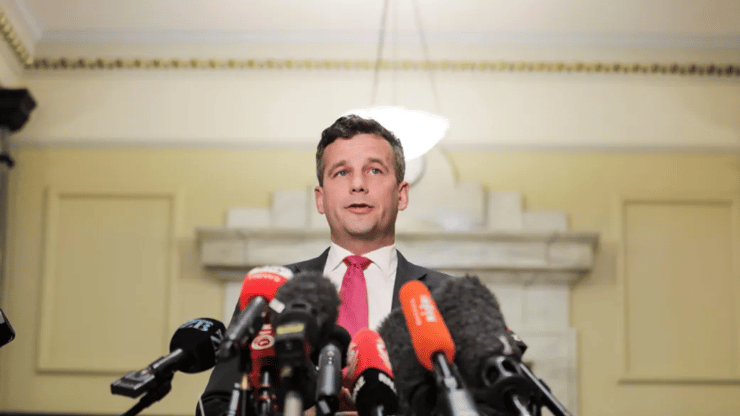
In a little over six months since the National-led coalition took power, there have been six applications to the Waitangi Tribunal for an urgent inquiry into the new government's actions. Five of them have been accepted, three are ongoing. All have been controversial.
The tribunal's examination of proposed changes to the Oranga Tamariki Act has generated the most heat. Children's Minister Karen Chhour refused to appear before, or give evidence to its inquiry into the matter. Legal challenges ensued. Ministers were asked for their views. Two in particular - ACT leader David Seymour, and NZ First's Shane Jones - did not hold back.
"Perhaps they should be wound up for their own good," Seymour said, of the tribunal.
Jones said he was looking forward to a review of the tribunal, as laid out in his party's coalition agreement with National.
"The Waitangi Tribunal has no business running its operations as some sort of star chamber delivering pre-emptory summons for ministers to rock up and be cross-examined or grilled in some kind of wannabe American star chamber pulp fiction gig," he told Waatea news.
In an open letter to Prime Minister Christopher Luxon, Te Hunga Rōia Māori o Aotearoa, the Māori Law Society, said the comments amounted to a breach of the Cabinet Manual.
"What these types of comments do is hang an axe over the Waitangi Tribunal, threatening to drop if they behave and exercise their powers in a particular way," Te Hunga Rōia Māori o Aotearoa co-president, Natalie Coates told E-Tangata.
At first, the High Court ruled ministers could not be required to give evidence by the tribunal. Then, the Court of Appeal overturned that, confirming that as a commission of inquiry, it is within the tribunal's jurisdiction to summons a minister of the Crown to give evidence if it is relevant. Days later, the tribunal announced it had accepted another request for a priority inquiry, this time into the disestablishment of the Māori Health Authority.
It all adds up to a stormy outlook for the tribunal and its work. The review outlined in the coalition agreement promises to refocus the tribunal's scope, purpose and nature back to its "original intent". But some leading Treaty and legal experts in Māoridom say the Tribunal is already doing exactly what it was set up to do in 1975. And the idea of scrapping it altogether provokes a mix of concern, bewilderment and outrage.
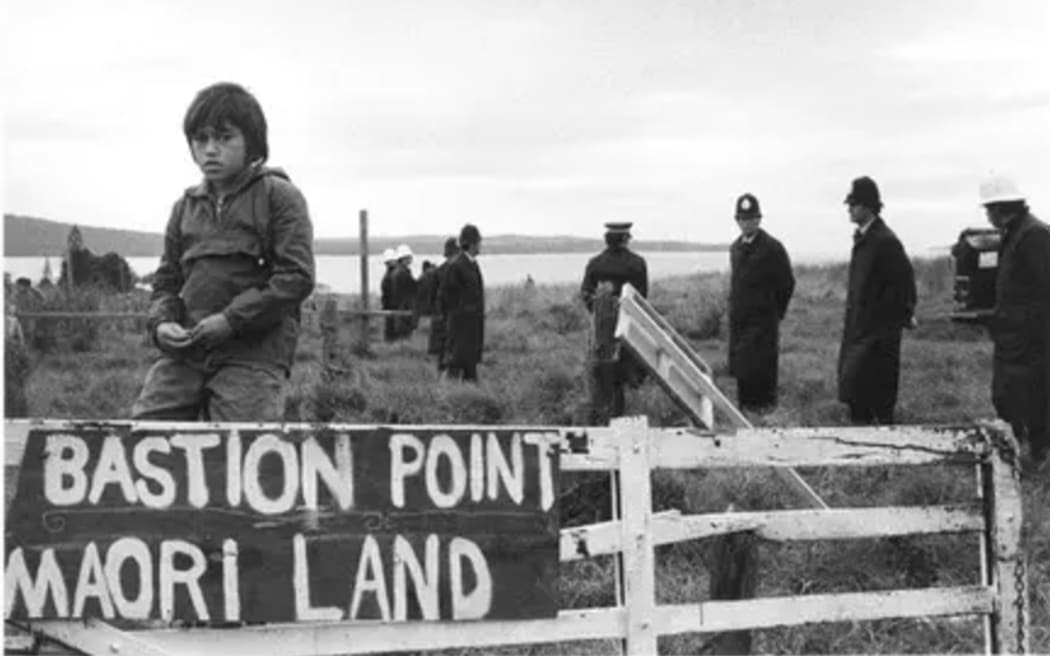
The first claim to the Waitangi Tribunal was in relation to land at Takaparawhau, Bastion Point - it was rejected for being outside the tribunal's scope at the time. Photo: Morrison, Robin. (1978) [Ngāti Whātua occupation of Bastion Point]. Auckland War Memorial Museum Tāmaki Paenga Hira. PH-1992-5-RM-N10-1.
The birth and growth of the Waitangi Tribunal
The Waitangi Tribunal is a standing commission of inquiry. Set up by law in the Treaty of Waitangi Act 1975, its job is to hear and investigate Māori claims regarding Crown breaches of the Treaty of Waitangi, and then make recommendations to the Crown about redress. It has the power to make findings of facts and recommendations, not binding decisions.
In its original form, the tribunal did not have jurisdiction to inquire into historical claims. Initially, it could only examine actions taken by the Crown after it came into force, from 1975 onwards. Its jurisdiction was specifically focussed on contemporary law, policy and practice.
The first claim heard by the tribunal was lodged by Joe Hawke from Ngāti Whātua ki Orākei. The claim concerned land loss at Takaparawhau, Bastion Point. But because the tribunal could only investigate contemporary issues at the time, in 1977 it rejected the claim.
In 1985, the Treaty of Waitangi Amendment Act was passed. That legislation allowed claims dating back to the signing of the treaty in 1840 to be investigated. A series of landmark cases followed, bringing the tribunal to the forefront of public and political life in Aotearoa.
In 1986, Ngāi Tahu Māori Trust Board filed a claim, kick-starting two years of hearings which covered nine different areas. In 1991, the tribunal released its 300-page report, suggesting substantial compensation. In 1998, the Crown and Ngāi Tahu agreed on compensation valued at $170 million.
Sir Douglas Graham was the first Minister of Treaty Negotiations, holding the portfolio for much of the 1990s. Originally elected to Parliament in 1984 for the National Party, the now 82-year-old has done many things in his lifetime. But he says nothing will live up to his time as Minister of Treaty Negotiations, which he describes as a huge privilege.
"It was probably the most fascinating thing I've ever done," Sir Douglas says.
As Treaty Negotiations Minister he successfully settled the Ngāi Tahu claim.
"It was intellectually challenging, it was very emotionally challenging. But I received much more than I was able to give and I enjoyed every moment of it. [It was] exhausting for everybody involved, because we were working at two and three in the morning frequently on the various claims and how to try to resolve them. But it was utterly fascinating.
"You suddenly realise when you start looking into these things, and particularly if you read some of the Waitangi Tribunal reports, you just realise the damage that had been done and the suffering that followed. And it's all very well to be wise after the event, but you can't be anything other than moved by the sad events of the past… We had to do something about it. You can't have 20% of your population in a grievance mode for hundreds of years. It's not good for them, for us or anybody. We had to try and find a way through."
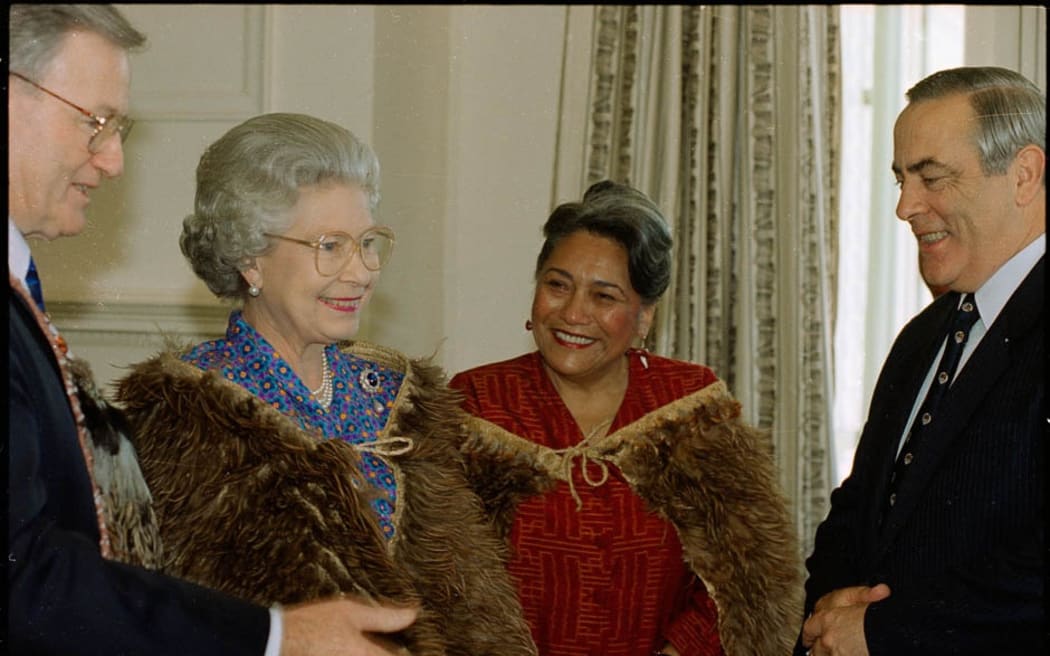
Former Prime Minister Jim Bolger, Queen Elizabeth II, Dame Te Atairangikaahu and Sir Doug Graham at the Tainui treaty settlement, 1995. Photo: The Dominion Post / John Nicholson
Without the research and deliberations of the tribunal, Sir Douglas says they would've got nowhere.
"I didn't have the ability to research years of historical events in 500 different claims. So the tribunal played an absolutely essential role. And I think on the whole, it has been an outstanding success."
In 2008, there was another amendment to the Waitangi Tribunal legislation, which meant it would no longer hear claims about historical matters. It would continue hearing claims about current Crown policy and actions. Essentially, it was refocused back to its original scope.
Since then, the tribunal has heard a number of contemporary claims relating to different kaupapa including the justice system, natural resources and environmental management, health services and outcomes.
Multiple urgent applications
Since its election late last year, the National-led government and its coalition partners, NZ First and the ACT Party, has announced a series of policies which have been attacked by critics as "anti-māori" and "divisive".
The disestablishment of the Māori Health Authority, ACT's Treaty Principles Bill, limiting te reo Māori use, reinstating referendums for Māori Wards, and the repeal of smokefree legislation have all been the subject of urgent claims.
An urgent inquiry into the repeal of section 7AA of the Oranga Tamariki Act was started earlier this year. It last week said it had found the coalition's planned repeal of Treaty obligations from the Oranga Tamariki Act would cause harm to vulnerable children.
But a subplot to the inquiry generated even more debate.
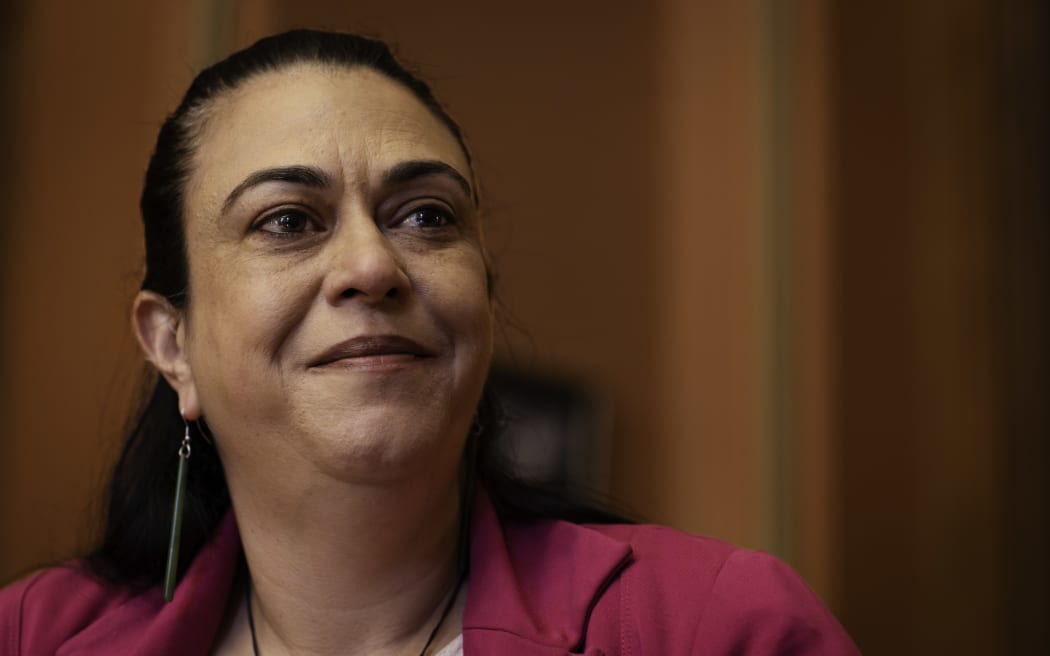
Children's Minister Karen Chhour Photo: RNZ / Angus Dreaver
In the course of its inquiry, the tribunal summoned Children's Minister Karen Chhour after she did not give evidence voluntarily. There was no precedent for such an order and it prompted debate about the role and powers of the tribunal, which is a commission of inquiry, not a formal court.
The Crown may yet appeal the Court of Appeal's decision in the tribunal's favour. Regardless, Chhour is very unlikely to appear before the tribunal because the government's bill has now been tabled and introduced to the house. It's effectively done.
The whole episode reflects a government determined to force the issue on the tribunal's future, says Dr Carwyn Jones, Kaihautū Te Whare Whakatupu Mātauranga at Te Wānanga o Raukawa.
"It does seem to me that, that in itself was a political choice intended to raise some of these questions around the tribunal's authority and powers," says Jones, who is also honorary associate Professor of Māori studies at Te Herenga Waka.
"I think you can see that playing out in the kinds of statements from Shane Jones and David Seymour."
After Carwyn Jones made these remarks, RNZ approached Seymour for comment. In a written statement, he said the Waitangi Tribunal has gone "well beyond its brief" and become "increasingly activist".
"The tribunal appears to regard itself as a parallel government that can intervene in the actual Government's policy making process," Seymour said.
Shane Jones's office did not respond to requests for comment.
Where will the review of the Waitangi Tribunal lead?
The exact wording in the NZ First and National coalition agreement says it will "amend the Waitangi Tribunal legislation to refocus the scope, purpose and nature of its inquiries back to the original intent of that legislation."
It's unclear what this means, Carwyn Jones (Ngāti Kahungungu ki te Wairoa) says.
"The tribunal started off as a body which was inquiring into contemporary government action that breached principles of the Treaty of Waitangi. It then had this historical jurisdiction for a little while, but it is now as far as I can tell, it's mainly focused on what the legislation originally was doing. So I'm not quite sure what the intent of the wording of this part of the coalition agreement is."
NZ First and the ACT Party will be expecting the review to make a case for the restriction of the tribunal's powers, he says.
Te Herenga Waka law lecturer Dr Luke Fitzmaurice-Brown (Te Aupōuri) agrees the review is an attempt to limit the powers and narrow the scope of the tribunal. The Waitangi Tribunal isn't perfect, he says, but the sort of review NZ First is proposing won't address its flaws.
"For all the tribunal's flaws, I think it's still a really important institution," Fitzmaurice-Brown says.
Others are more optimistic about the review.
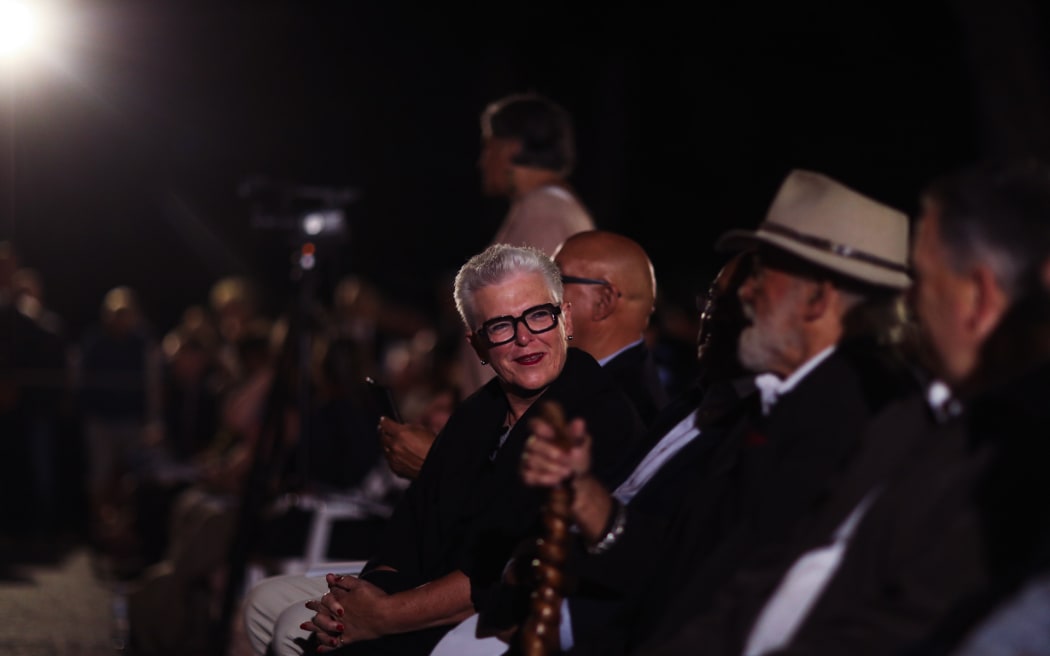
Dame Jenny Shipley at Waitangi in 2021 Photo: RNZ / Sam Rillstone
Former Prime Minister Dame Jenny Shipley has always been interested in Māori Crown relations. As Prime Minister, she delivered the apology on behalf of the Crown to Ngāi Tahu in 1998 when the settlement was signed.
Dame Jenny has kept up an interest in Māori politics. She's at Waitangi commemorations every year and this year was asked to speak at the national Hui-aa-motu at Tuurangawaewae Marae, which was called by Kiingi Tuuheitia in response to the coalition's policies.
She's seen first hand the contributions the tribunal has made.
"The tribunal's contribution to New Zealand, both from a Māori and Pākehā point of view, has been immense. And certainly in office in the '90s, the results of the tribunal's work, in firstly winning the confidence of Māori and gathering the evidence and the stories, it was able to both inform, and then enable the negotiation process between the Crown and Māori to achieve settlements, which were hugely historic."
Dame Jenny thinks it's a good time for a review.
"I do think it's in the interest of Māori and Pākehā to explore the role of the tribunal in the future, and we mustn't be afraid of review.
"I personally think that it's blind to simply say, we should never ask new questions. It's a question of is the tribunal fit for the future and fit for purpose. Given its great contribution to date, what will be its next contribution, if anything."
Whilst she says she doesn't have a fixed view on whether the tribunal should continue, she thinks it's important to examine its role.
"We should not come with a predetermined opinion, but rather a question in our mind of has it served us well? Is it serving us in a relevant way? And what does the future look like? We are in a completely different place than we were in 1975 and we're in a massively different place since 1990."
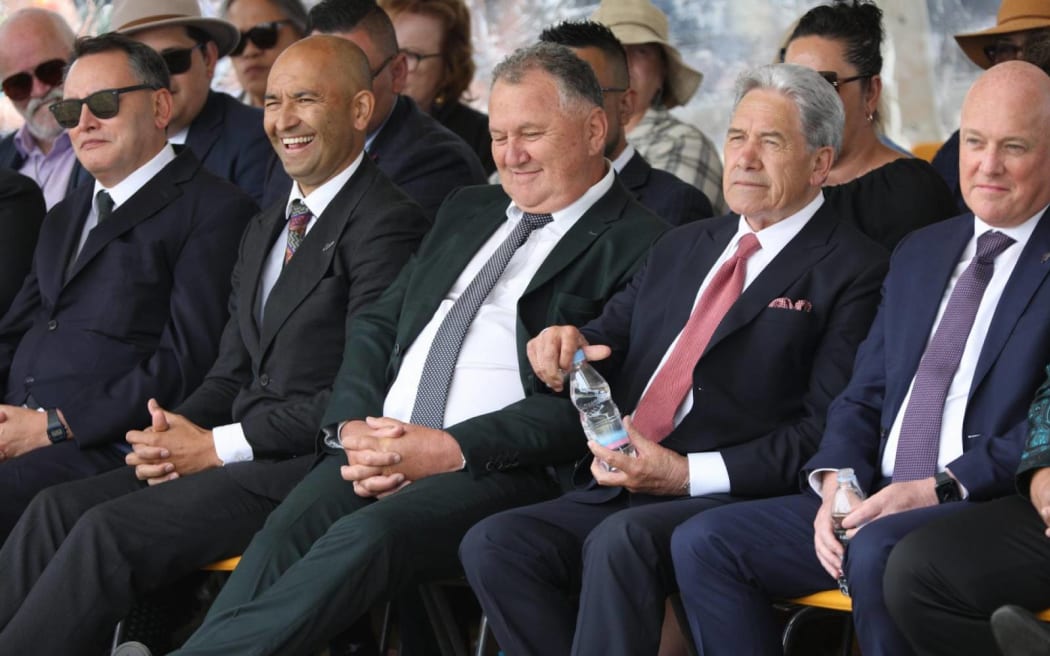
National and NZ First MPs at Ratana earlier this year. Photo: Angus Dreaver / RNZ
The government has not released any details about the review. It's likely Tama Potaka will oversee it as Minister of Māori Development.
Potaka did not answer RNZ's questions about what the review will look like, who will be involved or when it will happen. But in a written statement he said he was "seeking advice from my officials on key considerations that will need to be made in relation to any review of the Waitangi Tribunal."
Sir Douglas Graham says the review could be done fairly swiftly.
"I think they just need to say, look, we're going to review the jurisdiction and the procedures of the tribunal and see if we can improve it, not a matter of setting out to be critical," he says.
"But everything has its good and bad points. I would have thought they'd call for public submission, probably set up two or three people to listen to them and come back with some recommendations to the government. It can be pretty informal, it doesn't have to be hordes of lawyers everywhere."
Fitzmaurice-Brown, though, says the matter is too high profile to be done quickly.
He thinks the government may appoint an independent advisory body to take a broader look at the tribunal itself and the legislation.
"So ostensibly just kind of looking at the legislation and looking at the tribunal's functions, and looking at whether those are still fit for purpose."
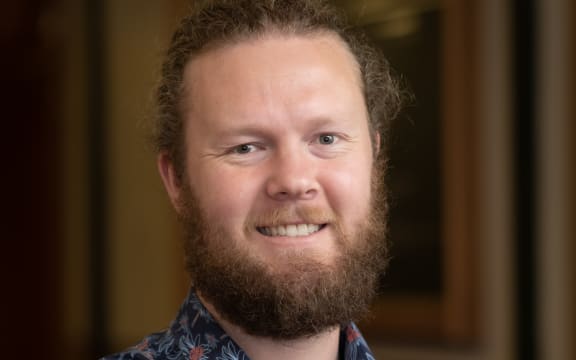
Luke Fitzmaurice-Brown Photo: Supplied
Shane Jones and David Seymour must be kept away from the review to avoid colouring its findings, he believes.
"If ministers like Shane Jones and David Seymour were involved … that would inevitably influence how that review is perceived. And if the government does want to demonstrate that they've had an independent look at this, then having ministers like that involved would make it difficult."
Power vs influence: How the tribunal leaves its mark
One of the key critiques of the tribunal in recent months is that it is "undemocratic", trampling across the agenda of elected governments. After all, many of the policies detailed in the coalition agreements - which the tribunal is urgently examining - were things the three parties campaigned on.
But this overstates the tribunal's powers, Carwyn Jones says.
"The tribunal can point out where there are flaws in the process or in the analysis, in terms of the policy objective, in terms of its consistency with the principles of the Treaty of Waitangi and provide that kind of analysis. But it doesn't prevent the government from doing whatever it wants to do on this matter anyway. So it's not an undemocratic thing at all."
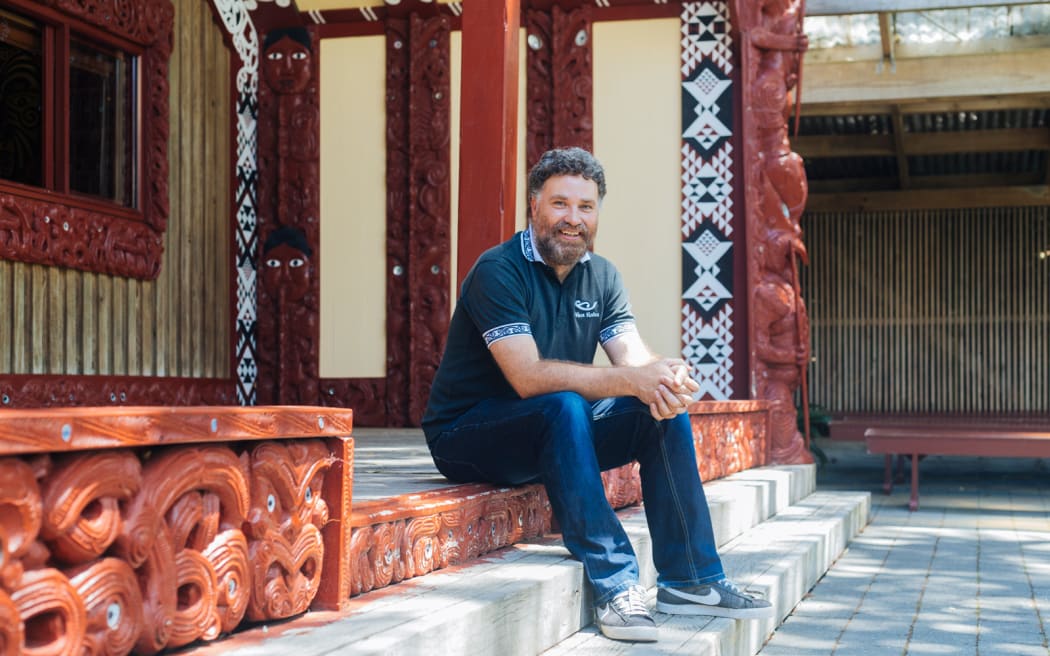
Carwyn Jones Photo: Chevron Hassett/The Wireless
Even before the current debate, there has been a long running discussion about whether the powers of the Waitangi Tribunal ought to be binding or not. Some have questioned why the tribunal should exist if it can't stop the Crown from breaching the Treaty. But giving it binding powers would fundamentally change the nature of the inquiry process, Carwyn Jones warns.
"It would become much more like a court. There would need to be much more court-like procedures around the nature of evidence, and I don't think any of those things are actually helpful for the task that the tribunal has.
"The Tribunal sometimes gets described as kind of like a truth and reconciliation process. And it's played a really important role in terms of New Zealanders understanding history. And often in very local ways.
"Yes the government can still choose, just as Parliament can choose to pass legislation, which is in breach of the Bill of Rights Act as it wants to. But there's a mechanism in the Bill of Rights Act that requires the Attorney General to report to Parliament and let them know if something is going to breach the Bill of Rights. So you can go ahead and do that but you need to be aware that you're breaching these rights."
Fitzmaurice-Brown agrees - Parliament essentially does whatever it wants.
"They regularly do ignore the tribunal's recommendations, but the tribunal still has this really important role constitutionally, societally for Māori and non-Māori, in my opinion, in reminding us of what Te Tiriti o Waitangi says and what it means.
"That is a really important form of accountability and oversight on any government, not just the current one."
Could abolition really happen?
The coalition could, in theory, get rid of the tribunal completely.
"Parliament could pass a law, which repeals the Treaty of Waitangi act. And in doing so, would disestablish the tribunal," says Fitzmaurice-Brown.
But what's legally possible and politically tenable aren't necessarily aligned.
"If they were to do that, I think we would see even more of an outcry from Māori, but I think from non-Māori as well. An outcry in what would be the most substantial and significant attack on Te Tiriti itself yet."
The tribunal's busy agenda shows it is still relevant and needed today, he argues.
"Part of what's happening at the moment is demonstrating its importance, like all of these urgent inquiries that it's undertaking currently, to me, show that it's still seen by Māori as a really important institution for us to be heard, and have our claims heard as the government becomes less sympathetic to those claims.
"The tribunal almost increases in importance because it becomes one of the last avenues where we can have those claims heard."
Sir Douglas Graham says getting rid of the Waitangi Tribunal would be absurd.
"To say, oh well it doesn't matter, we'll dump the tribunal or repeal it or something because we've settled all historical claims, or nearly all of them. It seems to me to be quite absurd. That assumes that the Crown will never breach the Treaty again. If you would tend to suggest that, that's forlorn.
"It served a wonderful purpose. It's done very, very well. The people who've served on it, have done their country proud. To take stock now and say, look, the historical claims are over therefore, we'll do away with the tribunal or restrict its powers seems to me to be rather silly, because that assumes that neither side are ever going to breach it again."
For Sir Douglas, the tribunal must have a role for decades to come.
"The Tribunal played an absolutely essential role. And I think on the whole, it has been an outstanding success.
"When you bear in mind that all the Treaty settlements today, over the last 30-40 years, add up to two months of national super payments. You realise that the cost of the Waitangi Tribunal is incontestable and the good far outweighs any cost."





